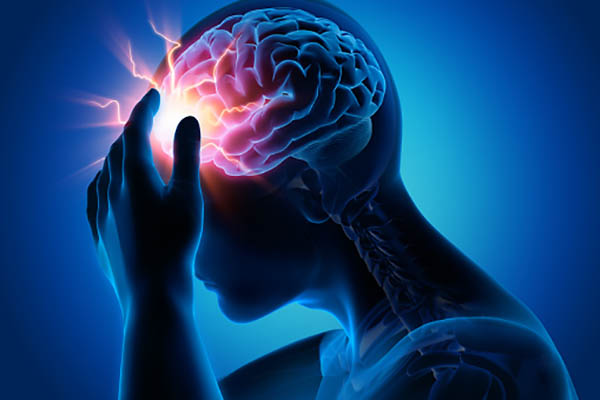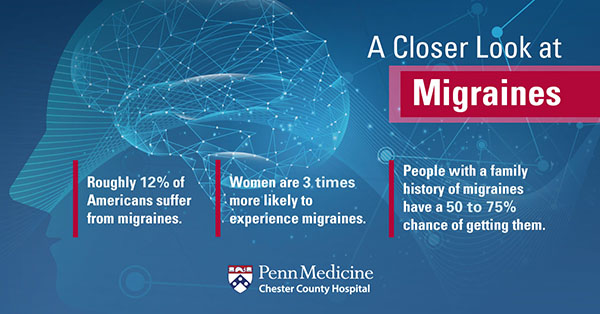
It starts with unexplained mood changes, followed by flashes in your vision. Then comes the sensitivity to light. Finally, it’s sheer exhaustion.
This is just one example of the many possible journeys of a migraine headache. Migraines — which are a recurring kind of headache — cause pain that is often described as throbbing or pulsing, often on one side of your head.
But migraines also come with other unique symptoms, like blurred vision, confusion, or uncontrollable yawning, and everyone experiences them differently. They range from mild, when you can mostly go about your normal routine, to severe, where you’re stuck in bed at home with all the lights off.
And unfortunately, this painful type of headache is common.

June is Migraine and Headache Awareness Month, a time for people to learn about these unpleasant experiences. It’s also a perfect time to identify what might be causing your migraines, so you can do your best to prevent them.
Here are 10 possible causes of your migraines and how you can keep them from impacting your life:
1. Stress
Stress is the root cause of plenty of conditions, from muscle tension to stomach problems to an increased risk of heart attack. Unfortunately, stress can also cause migraines.
Stress can mean being overwhelmed with constant meetings, a never-ending to-do list, or a jam-packed schedule. But it can also be stress on your body, like overexertion from a particularly intense workout, that leads you into migraine territory.
2. Anxiety
Similar to stress, the overwhelming feeling of anxiety might be the root of your migraines. Anxiety can range from occasional anxiety (like due to anxiety-causing events) to an anxiety disorder (when anxiety doesn’t go away and worsens over time).
Migraines can also cause anxiety, which can ignite a vicious cycle. The constant worry about when the next attack will come — and helplessness about its symptoms — can leave you frustrated and anxious. Then, that anxiety can actually cause a migraine attack.
3. Hormones
Women are more likely to get chronic migraines (15 days a month or more) — and that’s likely linked to hormones. Up to 19% of women get menstrual migraines (up to 2 days before your menstrual cycle and 3 days after), and 60% of these women get migraines at other times of the month, as well.
Migraines can also be related to menopause, hormonal birth control, pregnancy, nursing, and hormone replacement therapy.
4. Not Enough (or Too Much) Sleep
Sleep is one of the most important aspects of your health, and not getting the right amount can lead to migraines. Too much, too little, or a lack of a consistent sleep routine can all trigger an attack.
What’s more, sleep apnea (when your airway becomes blocked repeatedly as you’re sleeping, which limits or completely blocks your airflow) and teeth grinding during sleep can also cause migraine headaches.
5. Caffeine (or Caffeine Withdrawal)
If you’re a caffeine lover, it might actually be the cause of your migraines (even though some people occasionally use caffeine for headache relief).
The reason for caffeine leading to migraines isn’t completely clear, but it may be because it affects a naturally occurring substance in your brain called adenosine — the same substance that increases during a migraine attack.
Also, drinking caffeine three or more days a week can lead to dependency. As a result, not drinking enough caffeine that your body is used to can make migraine-sufferers experience attacks.
6. Smoking
Cigarettes are damaging to your body in many ways, like putting you at a higher risk for heart disease, stroke, and lung cancer. You can also add migraines to that list.
The nicotine in cigarettes causes your body’s blood vessels to constrict (or narrow), allowing less blood to get to your brain. This is one of the causes of migraine headaches.
Nicotine withdrawal can also lead to migraines, specifically for those who smoke less frequently. For instance, if you smoke one cigarette in the morning and then wait until the afternoon before having another, you might get a migraine in between. Of course, quitting smoking altogether can prevent nicotine withdrawal-related migraines in the long term.
7. Medications
Certain medications can be the cause of migraines. However, these same medications may also be critical for other parts of your health. Make sure to talk to your healthcare provider before stopping any medications.
Sometimes, migraine medications — either prescribed or over-the-counter — can actually make migraines worse. This is called Medication Overuse Headache, and it happens when you take more pain medication because of increasing migraines, which actually ends up causing more of them.
8. The Weather
When a storm’s a-brewin’, a migraine might be, too. Sudden changes in weather can be a trigger for some people getting migraines. For some, it’s one weather pattern, like a storm on its way. For others, it’s something completely different, like a change in temperature.
Weather-related migraines are particularly common if there are multiple factors at play. For instance, if you’re already lacking sleep, a major weather change might put you over the edge into migraine territory.
9. Certain Lights, Noises, and Smells
Overactivated senses may be a cause of your migraines. Loud sounds (like at a concert), bright lights (like flashing lights or intense sunlight), or strong smells (like perfume or paint smells) can trigger a migraine attack.
The exact way lights, noises, and smells impacts migraine-sufferers differs. For instance, one person might be triggered by a certain perfume, but another person might be able to wear that same perfume with no symptoms whatsoever.
10. Specific Foods and Drinks
Some people experience migraines right after eating or drinking something specific — especially when paired with another trigger.
Common foods and drinks that have been associated with migraines include:
- Alcohol
- Chocolate
- Fermented or pickled foods
- Cured or processed meats
- Aged cheeses
- Yeast
- Monosodium glutamate (MSG)
Identifying Possible Triggers to Prevent Migraines
If you suffer from migraines, knowing potential triggers is just the first step. The next one is to figure out which triggers impact your migraines.
Maybe one of the triggers on the list rings a bell automatically, like nicotine- or caffeine-related migraine attacks. But other triggers are more subtle, and it might take a little more digging to get to the root cause.
Start by keeping a migraine journal. When you get an attack, jot down possible triggers, like what you ate and drank that day, what the weather is like, and how much sleep you got the night before. Eventually, you may be able to identify a pattern and know to avoid triggers when possible.
If you still find you’re experiencing frequent migraines, or if the trigger is unavoidable (like with hormones or the weather), talk to your healthcare provider. They can help you identify patterns, and, if needed, prescribe medication.
Migraines are common, but that doesn’t mean they have to get in your way. Much like with other aspects of your health, listen to your body — and do everything in your power to keep it both happy and healthy.
Do You Have Questions About Migraines?
Visit our Physician Directory or call 610-738-2300 to make an appointment to speak to a healthcare provider at Chester County Hospital.